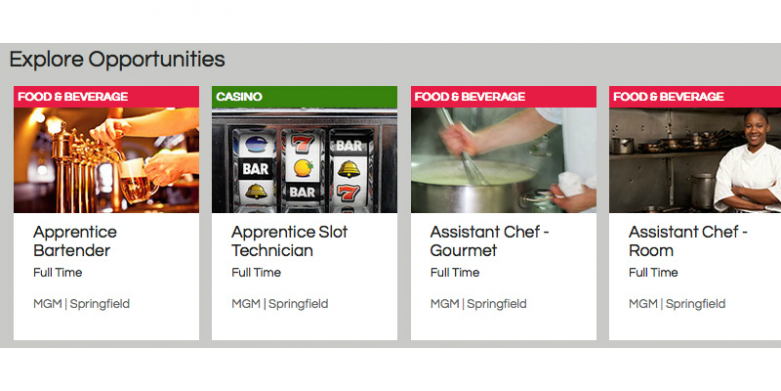
The Digital Divide Hits Home
In 2013 voters in Springfield, Massachusetts, approved MGM’s local casino application. There were major debates around what a casino would mean for the city. Opponents argued that a casino would lead to increases in crime, traffic and addiction rates. But the promise of more job opportunities outweighed those arguments when it came time to vote on MGM’s proposal.
I didn’t vote on this question because at the time I was planning to relocate to Florida and I didn’t think it was my place to vote on a decision that would not impact me directly. But things change, and now it’s likely that I’ll be around to see the casino come to fruition.
So what does this have to do with my work at Free Press? Everything! MGM Springfield just launched an online job portal allowing job seekers to see how their skills match with the positions the casino will need to fill in fall 2018. The first thing I thought of when I read about this was how many underserved communities are going to miss out on these employment opportunities because they don’t have access to or can’t afford Internet service. In fact, these same communities might not even learn of the portal’s existence since it’s being promoted online. This leaves those who aren’t connected at a gross disadvantage.
At Free Press we fight for your rights to connect and communicate via universally accessible, open, affordable and fast communications networks and devices. These networks are essential to our individual, economic and political freedoms. So when I saw an economic opportunity right here in Springfield, one that only people fortunate enough to have Internet access can take advantage of, I felt the need to write about it.
While I think it’s great that MGM Springfield is providing access to the portal via its local office space, this resource is currently available only during business hours, making it impossible for individuals with full-time jobs to use it. This is why we need just and equitable Internet policies that would lower the cost of Internet access and enable any individual in any part of the country to apply for jobs online.
The Internet is a powerful tool. It allows all people — regardless of race, gender, location and income level — to stay connected, engage, communicate, educate and innovate. And it’s a way to access employment opportunities.
Or at least that’s how it should work. But the reality is that big phone and cable companies aren’t interested in what the Internet represents. They don’t care about granting access to communities lacking broadband connections because it’s not profitable enough to build the infrastructure needed to get them connected. And companies like Comcast continue to charge steep prices for services that cost them only a fraction of what customers pay. This leaves low-income communities and low-income people of color at a disadvantage when it comes to accessing life-saving opportunities.
As a middle-income Latina living in Springfield, I have the opportunity and the means to stay connected. But the same isn’t true for my relatives, who have to choose between grocery shopping and paying for Internet service. Feeding their children will always win. But they shouldn’t have to choose. This is why we need Internet policies that benefit people, not corporations that are already rolling in cash.
Here in Western Massachusetts we have more than 30 towns without access to broadband. Residents in these communities can’t get their news online in real time, stay connected with relatives abroad, pursue educational opportunities, post Grumpy Cat memes on Facebook or access online job postings. And while these communities teamed up to create their own broadband fiber network, eight years of governmental delays and stonewalling have left the project in limbo.
There are similar stories all over the country. We must keep pushing the FCC to close the digital divide, boost competition among cable giants, and support efforts to establish municipal broadband networks that connect people at fair prices.
Many of us spend hundreds of dollars a month on Internet access. But too many people don’t have that luxury either because they can’t afford broadband or because it isn’t available in their communities. Yet the benefits of being connected are far greater than the cost to connect people. So why are we letting these companies get away with it?
Stand with Free Press today and take the first step toward fighting for your rights to connect and communicate.